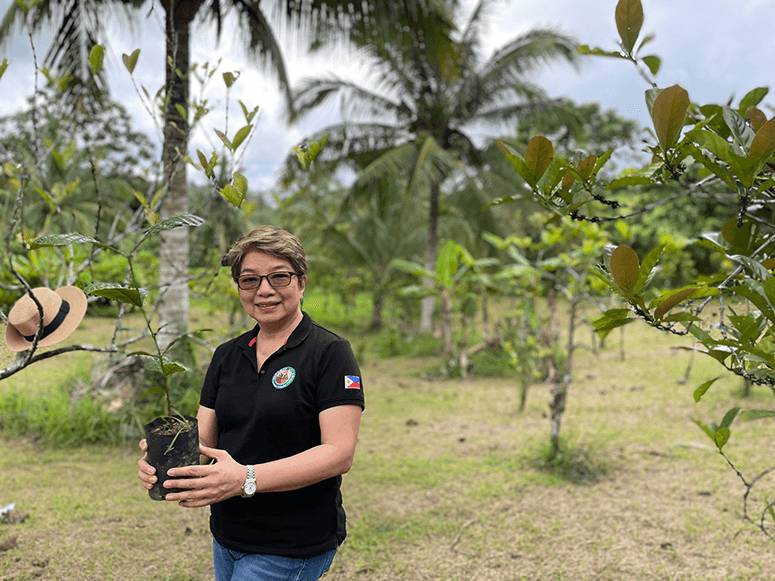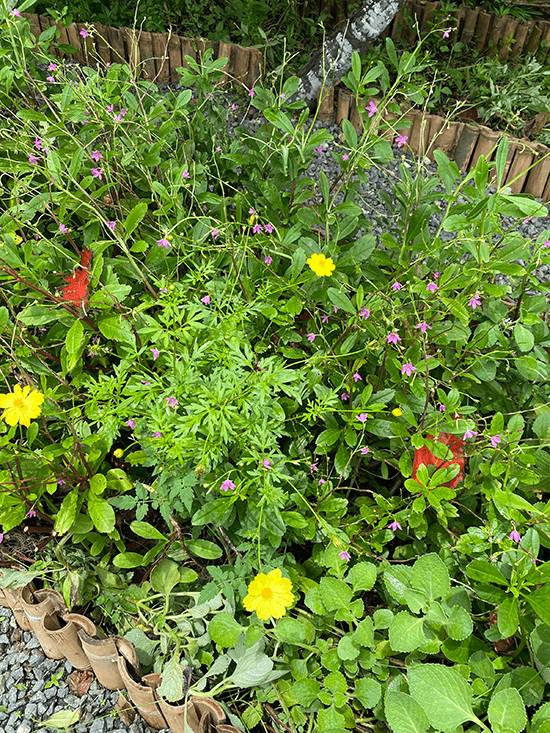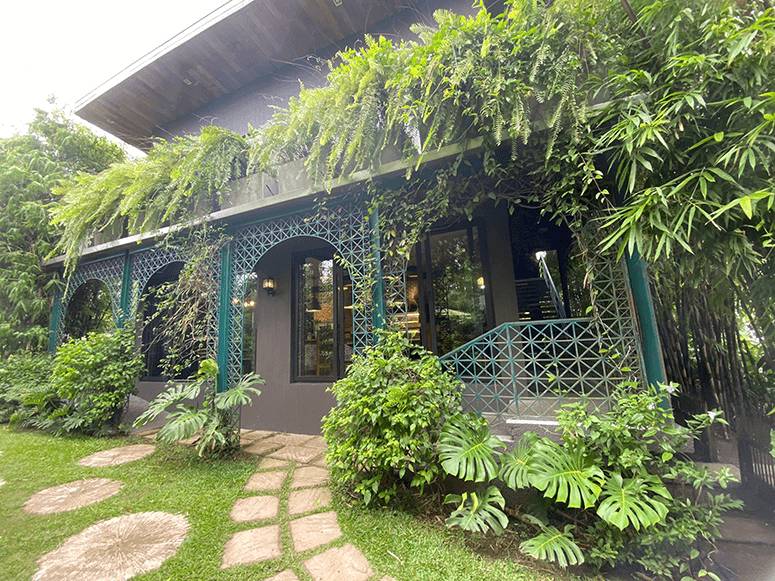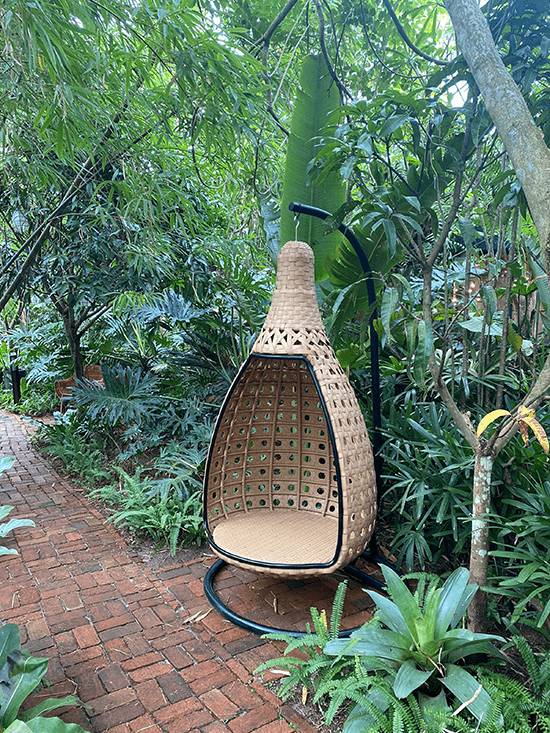Here’s where I found ‘weedicinals’ and ‘weedibles’
The town of Amadeo, Cavite—known as the coffee capital of the Philippines—is a 90-minute drive from Manila. The East-West Road that links Silang to Amadeo is flanked on both sides by wide, open fields where tall grasses thrive. Along the town’s narrow roads stand fruit trees that yield banana, pineapple, santol, jackfruit, and guyabano. Long-time residents of the town look back to the days—some 30 years ago, when the town was primarily green, and many planted vegetables in their backyards. I came to Amadeo to visit ECHOfarms, an herb farm owned by Chit Juan’s family, where she cultivates “weedicinals and weedibles,” and the coffee farm she has operated since 2005 where Liberica coffee is grown.
A woman who wears many hats, Chit describes herself as a social entrepreneur, a green advocate, a coffee crusader, and an advocate for women’s empowerment through business. As president and co-chair of the Philippine Coffee Board, Chit has been an advocate of organic coffee production and sustainable farming. She has promoted coffee locally and internationally for over 20 years. After serving as CEO of the Figaro Coffee Company for 15 years, she felt it was time to venture into social entrepreneurship, a cause that had become close to her heart.

Beyond a for-profit enterprise, it was about doing business that would create a positive social and environmental impact. Changing career paths was more of a natural progression than a sudden shift as she explained: “I have always been interested in where things come from—coffee, food, etc. I think this love for food and coffee got me into the organic, which then led to biodiversity which now is a social issue.” Does she believe that life often leads us to the places where we are meant to be, to do what we should be doing? She replied: “I believe the universe guides us to our purpose and through it.”
We began our tour at the herb farm. The concentric garden sits on a plot of 1,800 square meters, where Mediterranean herbs such as tarragon, oregano, rosemary, and thyme are planted alongside local pandan, lemongrass, banaba, tawa tawa, balbas pusa, and other varieties of aromatic herbs. Ornamental plants such as cosmos and an array of wildflowers with bright-hued blooms add vibrance to the green setting. Although the farm was acquired in 2005, Chit and long-time friends, Raffy and Reena Francisco began to work on the land during the COVID lockdowns. Raffy, an architect and a chef by training, designed the herb garden along the lines of a farm he once visited in Mexico.

Initially, the farm produced lettuce, arugula, and salad veggies for ECHOstore, a retail outlet that sold eco-friendly and natural products which was established in 2008. During the pandemic, Chit and ECHOstore partners, Reena Francisco and Jeannie Javelosa decided to close their stores in Serendra, Poduim, Rockwell, and Alabang Town Center. As they needed a hub for online sales, they maintained outlets on Valero Street in Makati and in Davao City.

Soon after, Chit decided to convert the vegetable plots into an herb garden that would yield edible and medicinal plants. Today, this green space draws chefs from the neighboring areas and from Manila who come to select herbs that can be incorporated into their dishes—whether it be for Italian or Asian cuisine.

Adjacent to the garden, an indoor space serves as a café during farm tours that Chit conducts regularly, or as a venue for lectures and seminars on organic farming and the virtues of green living. Within the space, shelves showcased products such as virgin coconut oil, crab paste, fruit jellies, grains, rice, herb teas, and coffee sourced from women farmers from all over the country. Most of the products come from farmer communities run by women. Chit tells me that women in small enterprises need a clear understanding of how their products can be made marketable, viable, and sustainable over the long term, as well as a venue where they can sell their goods. Chit, Reena, and Jeannie have been working toward this end for the last 15 years.
I think Mother Nature rewards you with a good harvest, and it is a treat to watch her at work. I have seen several harvest seasons and cycles of planting and harvesting, and it is just so gratifying.
It was the reason why they founded ECHOstore in the first place. It was all about giving poor producers market access, as well as helping marginalized groups and communities earn a livelihood. On the grounds, we saw women in an open-air hut who were sorting coffee beans cultivated from all over the Philippines. This is the first and crucial step before the beans are slow-roasted in small batches, packaged, and then sold at ECHOstore.

Leaving the herb garden, we stopped in the nearby town of Silang for lunch at Mrs. Saldo’s. Coming to the restaurant set amidst a verdant garden was a treat for the eyes and the senses. Cool and gentle breezes swept through the trees and the lush foliage that wrapped around the dining pavilion and the outdoor areas. The menu which features a selection of Asian-inspired and international fare was thoroughly delicious. We shared a fragrant fish curry made from Japanese yellow tail enhanced with cilantro and fried shallots, a pesto toast topped with burrata and a balsamic glaze and ended the meal with homemade cheese ice cream laced with parmesan shavings.

After lunch, we drove back to Amadeo and headed to the coffee farm, passing narrow country roads enveloped by greenery. The two-hectare plot is set in an area of gently sloping hills. By the entrance, we came across mango, tamarind, and narra trees. Native trees were planted around the perimeter so that the area would take on the look of a forest. Further on, we came to a small plot of herbs that are grown to supplement the plantings in the smaller farm, and a hut where Liberica seedlings are cultivated. Before crossing a footbridge that led to the highest point of the property, I sighted coffee, bamboo, coconut, santol, and balingbing trees. Low plantings included pandan and Thai basil. Reaching a pavilion poised at the summit of the hill, we looked out to sweeping views over Silang while sipping fresh coconut juice from the farm’s coconut trees.

Around the pavilion are plantings of duhat, cacao, banana, and kadios trees. With the bounties of nature all around, it is easy to see why Chit once thought of building a small cottage on the grounds to get away from the long COVID lockdowns. These days, Chit leads farm tours twice a week to share her knowledge of how a coffee farm works and the benefits of working close to nature. In the pavilion, she hosts events such as Slow Food meetings which dwell on issues such as access to good, clean, and fair food for individuals, the community, and the environment. How does nature reward those who nurture the land? Chit explains: “I think Mother Nature rewards you with a good harvest, and it is a treat to watch her at work. I have seen several harvest seasons and cycles of planting and harvesting, and it is just so gratifying.”
Looking ahead Chit says: “I want the farm to be a destination for people so they can understand more about coffee and the concept of Slow Food. Maybe a farm school is the next step so we can sustain these ideas and persuade more people to do what we are trying to do—to save endangered species, to respect biodiversity, to plant more coffee, and to have fun while doing all those things. It’s priceless!”


